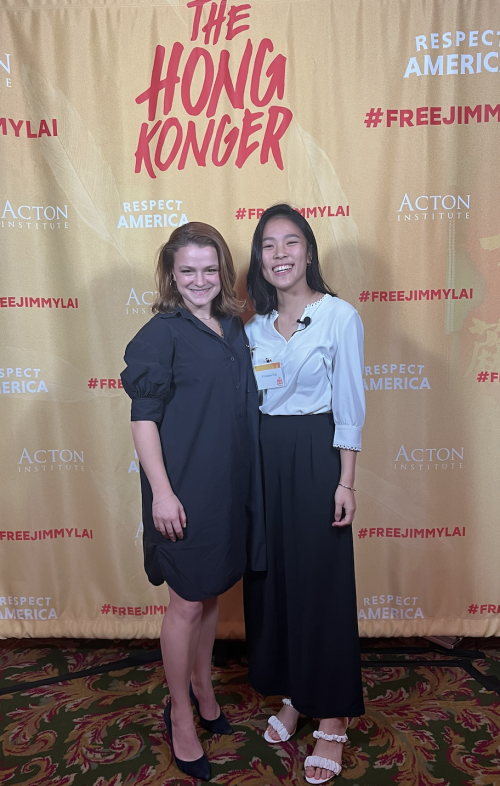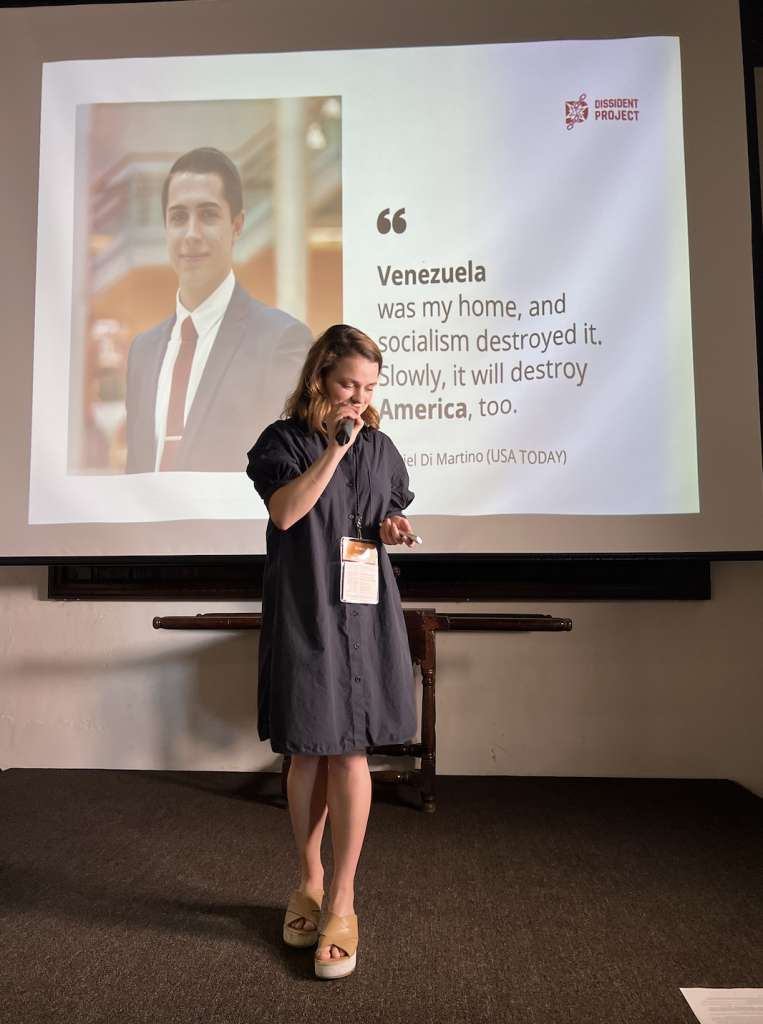The Dissident Project’s storytelling approach teaches high-school students about extremism’s threats to freedom

Grace Bydalek at the California premiere of Acton Institute's documentary "The Hong Konger," detailing the life and arrest of Jimmy Lai. Pictured with Hong Kong dissident Frances Hui.
Published 5/28/2024
*The opinions in this blog do not necessarily reflect the views of AHA Foundation*
In 2023, AHA Foundation formed a partnership with the Dissident Project to expand its campus program to high school students.
In this blog, the Dissident Project Director Grace Bydalek relates how her love of theater and storytelling led to crucial efforts to teach students how to think critically about increasingly lauded oppressive regimes. She describes how the partnership with the AHA Foundation campus program, also known as AHA’s Critical Thinking Fellowship, will help strengthen these efforts.
AHA Foundation: How did you become involved with the Dissident Project’s work?
Grace Bydalek: Each of my career endeavors can be strung together with a single thread — advancing people’s freedom, opportunities, and well-being through the power of storytelling.
My passion for storytelling originates from my BFA in Musical Theatre from the University of Michigan. But I resisted the industry’s orthodoxy. I now lead the Dissident Project’s efforts to send young dissident speakers to high schools, fostering dialogue and gratitude for liberty through personal stories of authoritarianism’s negative impact.
“Failure to nurture an appreciation for the blessings of liberty among American youth puts our constitutionally guaranteed system of limited government and individual rights at risk.”
AHA Foundation: Why is it important for students to hear the stories directly from the dissident speakers?
Grace Bydalek: Many young people today have no grasp of the historical atrocities of socialism and fascism. According to Pew’s latest poll, 36% of Gen Z now hold a favorable view of socialism. Failure to nurture an appreciation for the blessings of liberty among American youth puts our constitutionally guaranteed system of limited government and individual rights at risk.
This is where the Dissident Project comes in.
By presenting the threat of illiberalism through firsthand accounts of young witnesses, the Dissident Project establishes connections and persuades students about the paramount importance of freedom, surpassing the impact of conventional teaching methods or history textbooks.
Our speakers sow the seed of freedom in the minds of students such that when they hear about the wonders of authoritarianism and government intervention in college, they remember the Venezuelan, Cuban, or Hongkonger speaker who told their story to their class.
AHA Foundation: What is the significance of collaboration between AHA’s Critical Thinking Fellowship and the Dissident Project to bridge this crucial gap in education?
Grace Bydalek: The partnership fosters critical thinking, using several strategies:
Collaborative approach: AHA’s Fellowship emphasizes critical analysis while the Dissident Project promotes awareness of the dangers of authoritarianism and the blessings of liberty, mutually enriching students’ educational experience.
Encouraging questioning and debate: Students engage in constructive dialogue, questioning authority and exploring diverse viewpoints, fostering open-mindedness.
Promoting civic engagement: Equipping students with critical evaluation skills and historical awareness empowers active citizenship, even before they are of voting age.
Raising awareness of authoritarianism and extremism: By analyzing contemporary examples, students learn how to recognize and combat threats to democracy and human rights.
“Dr. Hamid’s firsthand experience with extremism provided students with insight into radicalization’s complexities and the erosion of human rights by authoritarian ideologies. The response was overwhelmingly positive.”
AHA Foundation: How does this approach work in practice?
Grace Bydalek: Last November, the Dissident Project partnered with AHA’s Critical Thinking Fellowship to host an event featuring Tawfik Hamid, an Egyptian-born doctor and former extremist who told 60 students and educators about his journey from radicalism to reform.
Dr. Hamid’s firsthand experience with extremism provided students with insight into radicalization’s complexities and the erosion of human rights by authoritarian ideologies.
The response was overwhelmingly positive. Our host educator said: “Today was excellent! Everything went well and several scholars asked questions. Thanks for creating this connection and offering this opportunity to Chavez. We hope to bring more Dissidents to speak with our scholars!”
We are working with AHA staff to expand these efforts, bringing more speakers nationwide to amplify diverse perspectives on extremism, authoritarianism, and dissent, aiming for a lasting impact on high school education and civic engagement.
“So far, we’ve arranged 110 dissident talks, reaching an estimated audience of 18,000+ students in classrooms across 20 states.”
AHA Foundation: What role can educators play in equipping young minds with the critical thinking skills necessary to navigate an increasingly complex world?
Grace Bydalek: While our organizations can offer these resources to students across the country, a great teacher has to open the door to their classroom for us to make an impact. Without passionate educators, our programs would not exist.
Our dissidents know this firsthand. In spring 2022, Daniel Di Martino, a Venezuelan freedom activist and founder of the Dissident Project, spoke at Algonquin Regional High School in Northborough, Massachusetts, after being invited by a generous teacher, Gina. He only realized on the train home that she had paid for the entirety of his trip out of pocket, from the travel to the honorarium. Her initiative enriched students’ education and catalyzed the Dissident Project, showcasing educators’ power to inspire change and foster meaningful discussions.
AHA Foundation: What successes have you observed in terms of engaging students and fostering dialogue about authoritarianism?
Grace Bydalek: So far, we’ve arranged 110 dissident talks, reaching an estimated audience of 18,000+ students in classrooms across 20 states. Highlights include Daniel Di Martino speaking to 1,800 students at American Preparatory Academy in one day. Several schools have become repeat partners, with both the American Preparatory Academy and Algonquin Regional High School requesting speakers twice.
However, these aren’t the most important metrics to us. Below is feedback from our host educators and administrators which means more than the numbers!
AHA Foundation: What is your future vision for the partnership between AHA and the Dissident Project?
Grace Bydalek: We envision expanding our collaborative speaker series and reaching exponentially more schools and classrooms nationwide. We are working to integrate discussions about authoritarianism and liberty into existing curricula and provide teachers with the tools and support they need to facilitate meaningful conversations in the classroom.
By building on the momentum generated by the pilot event, we aim to create a lasting impact on high school education and empower students to become informed and engaged citizens in their communities and beyond.
AHA Foundation: If a high school student would like to bring one of your speakers to their school, how can they reach you about this?
Interested students or educators can visit our website to book a speaker, or follow us at @dissidentproj on social media for real-time updates.
Tawfik Hamid: From Radicalization to Redemption, Journey and Strategies in Countering Radical Islam






